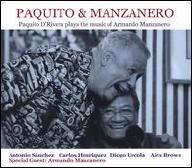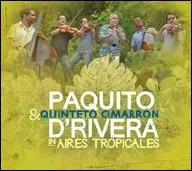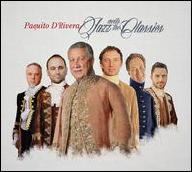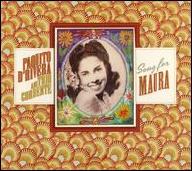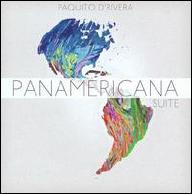D'Rivera inherited his understanding of music from his father, Tito, a classical saxophonist and conductor. At the age of five, he began learning musical theory from his father. Within a year, he was playing well enough to be paid. By the age of seven, he became the youngest musician to endorse a musical instrument (Selmer saxophones). Three years later, he performed with the National Theater Orchestra of Havana. Although he initially played soprano sax, D'Rivera switched to the alto after teaching himself to play via the book Jimmy Dorsey Saxophone Method: A School of Rhythmic Saxophone Playing. Strengthening his knowledge of music and playing techniques, D'Rivera began studying at the Havana Conservatory of Music in 1960. In 1965, he became a featured soloist with the Cuban National Symphony Orchestra. Instrumental, his debut solo album, appeared in 1967. After playing with the Cuban Army Band, he joined pianist Chucho Valdez in founding the Orchestra Cubana de Musica Moderna, and served as its conductor for two years.
In 1973, he joined eight members of the Orchestra Cubana de Musica Moderna to form Irakere. The group, which fused jazz, rock, classical, and traditional Cuban music, became the first post-Castro Cuban group to sign with an American record label (Columbia). D'Rivera toured the world with Irakere, who became a top-rated jazz ensemble. In 1976, he released an eponymous second leader album. Irakere issued their self-titled debut in 1978 and won a Grammy in 1979, the same year they played the legendary Havana Jam, recorded and released the following year.
In 1981, D'Rivera defected from Cuba to the United States. Before long, he was playing with such American musicians as Dizzy Gillespie, David Amram, and Mario Bauza. According to Bauza, D'Rivera was "the only musician I know on the scene playing the real Latin jazz, all the others are playing Afro-Cuban jazz."
D'Rivera's debut North American solo album, Blowin', released in June 1981, was followed by Mariel a year later. Time magazine wrote, "The bopped-up, romantic, salty and sensuous jazz that he makes recognizes no real political boundary. It has its roots equally in the hothouse Latin rhythms of his homeland and in the high-flying horns of Charlie Parker, John Coltrane, and Lee Konitz."
Between 1983 and 1987, D'Rivera released five more albums with Columbia and all charted. They include Live at Keystone Korner, Why Not!, Explosion, and Manhattan Burn. His final album for the label, 1988's Celebration, was released on the occasion of having attained U.S. citizenship, seven years after his arrival.
That year saw D'Rivera invited to become a founding member of Dizzy Gillespie's 15-piece all-star group the United Nations Orchestra. He also served as a guest soloist with the National Symphony Orchestra for the world-premiere performance of Roger Kellaway's David Street Blues. He continued to be involved with a variety of projects. In addition to performing with the Paquito D'Rivera Big Band, the Paquito D'Rivera Quintet, the chamber music group Triangulo, and the calypso and salsa band the Caribbean Jazz Project, he began to accept commissions to compose for chamber groups and orchestras. In 1989, he composed "New York Suite" for the Gerald Danovich Saxophone Quartet, and released his Chesky debut, Tico! Tico! He issued the Latin- and bossa-infused Return to Ipanema for Town Crier that same year. In 1991 he released the star-studded Reunion for Messidor with guest soloist Arturo Sandoval and a band that included Giovanni Hidalgo, Danilo Perez, and Fareed Haque. 1992's Havana Cafe included most of the same band. In 1994, D'Rivera
composed "Aires Tropicales" for the Aspen Wind Quintet. The piece has subsequently been performed by several groups.
In 1997, D'Rivera's Portraits of Cuba received a Grammy Award for Best Latin Jazz Performance. That year he also collaborated with the percussion group the Caribbean Jazz Project on Island Stories and released Live at MCG with the United Nations Orchestra and the original classical work Chamber Music from the South, on which he led a trio playing clarinet exclusively.
During the summer of 1999, he collaborated with Germany's Chamber Orchestra Werneck in a series of programs, D'Rivera Meets Mozart. D'Rivera was artist-in-residence for the New Jersey Performing Arts Commission and artistic director in charge of jazz programming for the New Jersey Chamber Music Society. He also released Tropicana Nights, leading a big band in a program of Latin jazz and dances. His autobiography, My Saxual Life, was published by the Spanish book publisher Seix Barral, along with a novel, En Tus Brazos Morenos, scheduled to follow shortly afterwards.
Live at the Blue Note appeared in the spring of 2000, and Habanera, as part of a sextet, followed on Enja in early 2001. That year, D'Rivera released The Clarinetist, Vol. 1, relying exclusively on the strengths of its woodwind namesake. Arriving in 2002, Brazilian Dreams was an acclaimed live recording featuring the New York Voices and trumpeter Claudio Roditi; it won a Grammy for Best Latin Jazz Album. It was followed in 2003 by the swinging Big Band Time that made the Top 200. Several more well-received albums followed in 2004, including Music of Both Worlds, the striking Tribute to Cal Tjader, and Riberas (which also took home the Latin Grammy for Best Classical Album). The Grammy-nominated Jazz Chamber Trio followed in 2005. In 2007 D'Rivera delivered Funk Tango, which wove the tango innovations of composer/bandoneonist Astor Piazzolla into Latin and Brazilian jazz settings; it too claimed a Grammy, this time for Best Latin Jazz Album. Two years later, he teamed with clarinetist Sabine Meyer for Jazz Clazz.
In 2010, D'Rivera released the live Panamericana Suite. An original composition, it is often regarded as his magnum opus. It won two Latin Grammys for Best Latin Jazz Album and Best Classical Contemporary Composition, making D'Rivera the first, and only, artist to win the awards in both Latin and classical categories.
D'Rivera joined Paraguayan classical guitar virtuoso Berta Rojas for Día y Medio: A Day and a Half in 2012. In 2013, D'Rivera paid homage to his mother with the Brazilian-themed trio album Songs for Maura, which won Best Latin Jazz Album Grammy prize. A year later, he combined his love of jazz and classical with Jazz Meets the Classics, featuring adventurous reworkings of compositions by Beethoven, Mozart, Chopin, and others.
Released in 2016, Aires Tropicales featured D'Rivera backed by the Quinteto Cimarron string quartet. Also that year, D'Rivera showcased the music of storied Mexican singer, pianist, and composer Armando Manzanero on Paquito Manzanero. In 2017 he released Kites Over Havana, leading a quartet of four Cuban master saxophonists who reside in the United States: Oscar Gongora on soprano, Roman Filiu on alto and soprano, Alejandro Rios on alto and tenor, and Raul Cordies on baritone saxophone.
In 2020, D'Rivera was a featured soloist on the Diego Urcola Quartet's El Duelo. In February 2021, D'Rivera released Cariberian leading a sextet. In July 2022, he teamed with his old bandmate and world-renowned pianist Chucho Valdez and a sextet for I Miss You Too! ~ Thom Jurek & Craig Harris, Rovi


